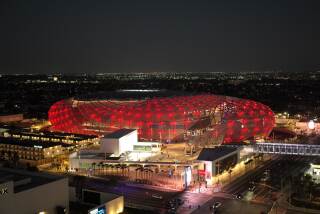Heat Wants to Be a Good Neighbor
- Share via
When last the world looked in on the little corner of Miami known as Overtown, the place was smokin’. It was late January, the Super Bowl was packing up its tents and sweeping up its peanut shells, and in nearby Overtown the ashes and the anger hadn’t completely cooled.
The ghetto neighborhood almost burned down in riots that started about the same time as the Super Bowl Week festivities. A policeman shot a suspected criminal off a motorcycle, and Overtown (and Liberty City) rioted.
The riots were terribly embarrassing to Miami, which was counting on the Super Bowl to wipe out the city’s Miami Vice image. The riots were embarrassing to the NFL, and annoying. It’s hard to make an occasion look properly grand and festive when it’s playing against a backdrop of barbecued buildings.
Lobster thermidor was promised; ghetto thermidor was served.
The riots ran out of steam several days before the game, for which Pete Rozelle publicly gave thanks. “The one big plus,” he said, “is that it’s early in the week.”
Now, nearly three months later, comes some good news from Overtown. The NBA’s Miami Heat has announced plans to build a community center in that downtrodden corner of the city.
If Miami will donate a piece of land, the Heat will build the building and give it to Overtown. There will be a gym, locker rooms, weight rooms, boxing facilities, tennis courts, a swimming pool, classrooms and a day-care center.
Volunteers from nearby colleges will be enlisted to help run the show. Heat players and other Miami pro athletes have promised to get involved.
The rec center is not a knee-jerk reaction to the riots. The Miami Arena is on the edge of Overtown and the team’s front office was acutely aware of neighborhood conditions long before SuperRiot week, when one of the Heat’s games was called on account of the heat.
“We were planning this project more than a year ago,” says team owner Lewis Schaffel. “I can’t even remember where the initial notion came from. We were looking to build a facility to practice at when the Arena is not available. We came up with this idea, we felt we could do some good, help the quality of life in Overtown. We want to try to make it as first-class as we can, something the people can be proud of.”
Growing up in Brooklyn, Schaffel and his good pal, Billy Cunningham, spent a lot of time at the local rec center. Cunningham went on to become a pro basketball star, the Kangaroo Kid, then a successful NBA coach, then a partner in the Miami Heat.
“That community center in Brooklyn made a difference in my life, and in Billy’s, so we know the impact something like this can have,” Schaffel says.
The weird thing about all this is that the Heat, which hasn’t completed its first season, is the only pro franchise that I’ve ever heard of to do something this big for its neighbors. An irony of big-time sports is that the richest teams, attracting the wealthiest fans, often perform in the humblest areas of town. Their games are least accessable to the closest fans. Yankee Stadium, the L.A. Coliseum, to an extent the Forum and Dodger Stadium, are examples of this.
I’m sure a lot of team owners reach out into the communities in various ways--donate money, sponsor clinics, fund scholarships. But the Heat is breaking new ground here.
“I think professional sports teams can do more,” Schaffel says, “they can make a difference. When our players were told of the idea, everyone felt good about it, they all agreed to donate time, they felt it was something special. It makes us feel good.”
Maybe the Heat will find out why no other teams have done this kind of thing.
One or two local politicians have expressed reservations about the project. Maybe the city won’t donate land for something that will bring in no tax revenue. Maybe it’s not what the people of Overtown really want.
Maybe it will prove too costly, even for the box-office-boffo Heat.
Maybe the Heat will have to be renamed the Miami Naive.
The rec center seems like a great idea, but as someone once said, “A great idea is an idea that works.”
Still, how can you fault a team that wants to do the opposite of what so many teams and players are perceived of as doing these days--wallowing in greed and excess?
“We can be more than just a basketball team,” Schaffel says.
If that’s not a great idea, it’s a great idea for a great idea.
More to Read
Go beyond the scoreboard
Get the latest on L.A.'s teams in the daily Sports Report newsletter.
You may occasionally receive promotional content from the Los Angeles Times.










